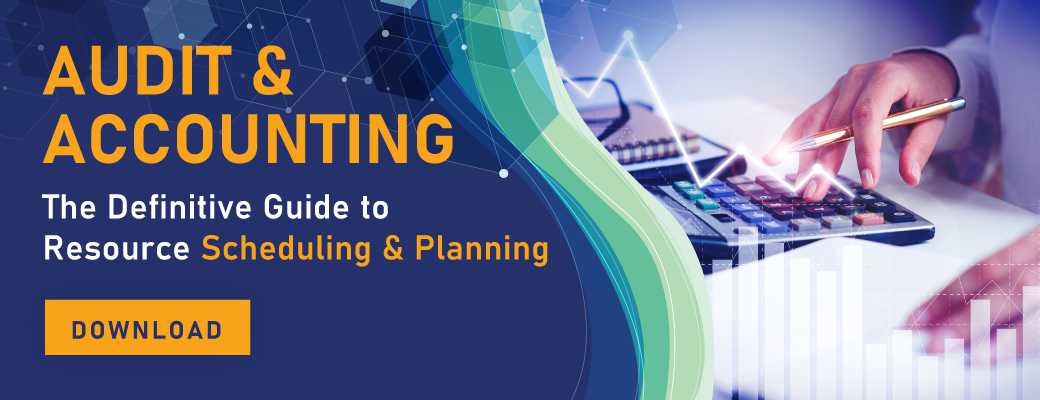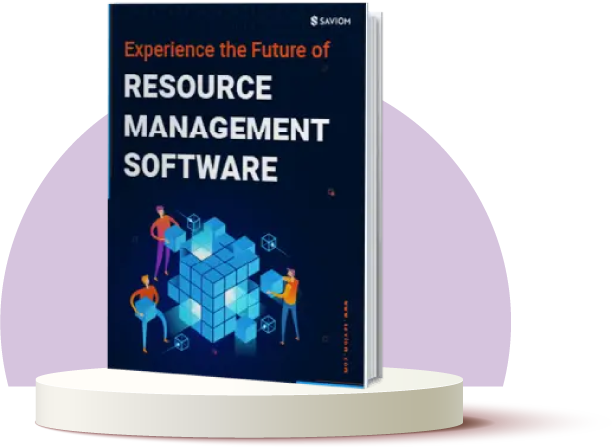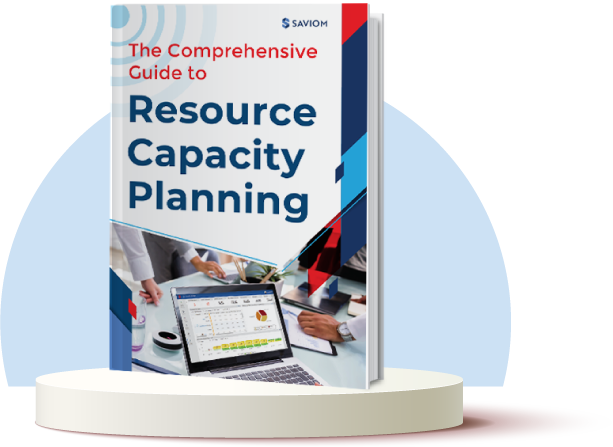Human resources are the biggest investment for an audit and accounting business. So, the business must utilise its resources most efficiently and intelligently. It becomes more crucial, especially when the businesses are facing a highly competitive and volatile global market.
Many project-intensive businesses use either silos of spreadsheets or some home-grown tools for scheduling and planning their resources. These solutions are incredibly limiting, time-consuming, and hard to maintain. It creates double bookings, over/underutilised resources, undesirable hiring/firing, low staff morale, improper planning of pipeline projects, etc.
To achieve the full potential of your resources, it is crucial for an audit and accounting firm to establish an enterprise-level resource scheduling and planning process.
This guide has been designed for an audit and accounting business to get a comprehensive understanding of resource scheduling and planning system. It will allow the business to establish the right process and the tool.
What is Resource planning and scheduling?
Defining Resource Planning
Resource Planning is the method of planning and utilising various types of business resources effectively and efficiently across the enterprise. These resources can be workforce, assets, facilities, equipment, etc.
Defining Resource Scheduling and Resource Allocation
Resource scheduling is the most crucial part of the resource planning process. It involves identifying and allocating resources for a specific period to various types of activities. These are related to project work or non-project work, i.e., like BAU, Support, admin, operation, etc.
Resource allocation is the other word for resource scheduling. In short, resource allocation identifies and allocates resources to the projects at a high level.
One must avoid the “first visible first fit” approach instead of the “best visible best fit” principle for resource allocation.
Read More: The 5 Best Methods Of Successful Resource Allocation
What are the benefits of Resource Scheduling and Planning Solution?
An effective workforce scheduling and planning system can resolve several challenges faced by an audit and accounting firm with the matrix organisation. It will provide immense benefits in the following areas:
Gain visibility of all your resource or workforce demand across the enterprise
The system can achieve 360-degree visibility into all work demand types, be it project, non-project, BAU/admin, and vacations. It also highlights this information across verticals of geography, functions, domains, and business units.
Deploy competent person at the right time and cost
Having the right person with the right skills is crucial for a project to finish within budgeted time and cost. Resource scheduling methodology can Identify and allocate a competent person. It can be based on their skills, experience, qualifications, location, team, cost rate, and any other criteria you prefer. In the absence of such a capability, the organisation will land up with a large bench of mismatched skillset.
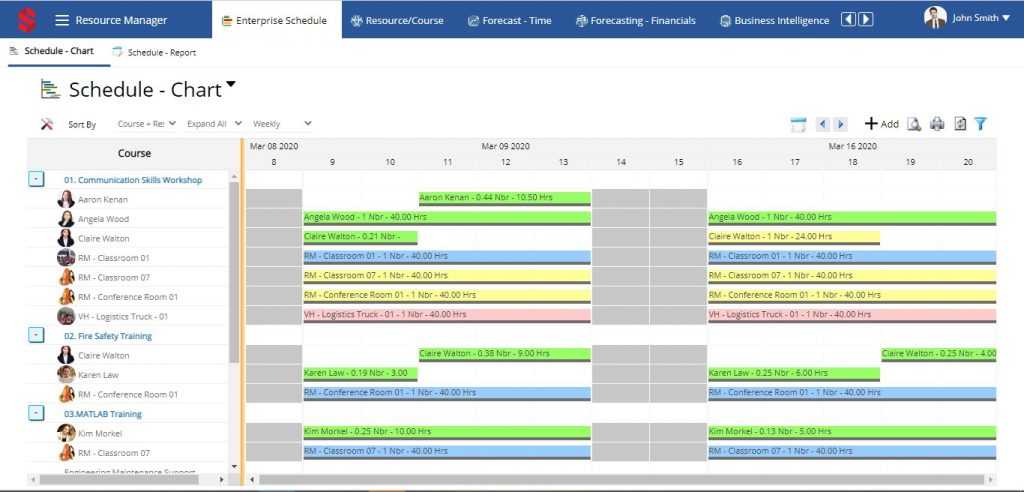
Forecast shortfall/excess of resources and take corrective actions
The system can forecast resource demand for every type of project and non-project work to Identify shortfall/excesses of resources. You can adjust project timelines, retrain current employees, or hire a contingent workforce ahead of the time.
Maximise utilisation of workforce on billable and strategic projects
The system can forecast billable and strategic utilisation of the workforce ahead of time so that you can mobilise employees from non-billable or low priority work to billable or high priority projects.
Billable utilisation is a critical KPI for a professional service business to ensure profitability and sustainability.
Read More: Maximize Profitable Resource Utilization with Modern Resource Management Solution
Control project cost ahead of time by forecasting project financials
The system can track critical financial indicators for a project like resourcing cost, revenue, profit margins, and overheads. It can help you take corrective action and control project costs ahead of time. It will help you to control Band Mix for a typical IT services organisation.
What Resource Scheduling and Planning Tools are Currently Used by Audit and Accounting Firm?

Most of the audit and accounting firms are fighting against the resource management challenges of the 2020s with the systems developed in 1990s.
It is valid for all types of companies irrespective of the size or market share or market reputation. The tools listed below are some examples of legacy systems:
- Silos of spreadsheets built with macros
- Home-grown half-baked systems
- Windows-based systems of the 1990s
- Entry-level resource scheduling software
Most of these outdated legacy tools have the following challenges: –
- Easy to develop but difficult to maintain
- Paying a high price for lost market opportunities
- Unable to provide forecasting and capacity planning
- Not designed for improving profitable utilisation & cost reduction
- Unsuitable for matrixed organisation structure
- Unable to deliver real-time business intelligence
Best practices for efficient resource scheduling and planning solution
Resource scheduling is not only about plugging the hole by scheduling or allocating resources against the projects. It goes much beyond this process. A comprehensive resource scheduling and planning solution includes enterprise-wide resource scheduling, forecasting, capacity planning, utilisation management, tracking actuals, etc.
Enterprise resource or workforce scheduling
The system should provide a single schedule for the whole enterprise to establish a single source of truth. For example,
- Scheduling or allocation can be done in real-time by multiple stakeholders
- agile resource allocation can be achieved with easy drag and drop
- the schedule can be viewed in numerous ways in a matrix organisation structure
- Ensure there is no double booking
Management of matrix organisation structure
Most of the large organisations have now moved into a matrix reporting structure that has multiple dimensions. The resource planning system provides visibility of people’s information across the complex matrix organisation structure and controls the rights to modify them. It ensures that resources are not fallen in the cracks.
Competency tracking and allocating right people
It is critical to keep competency information up to date. The right people are assigned to the right project across the enterprise based on skill, experience, qualifications, location, cost rate, etc. This information can be updated by the concerned user, which can be validated before accepting it.
Read More: Resources and Capabilities Analysis: The Human Resource Perspective
Forecast workforce utilisation
The system should provide short- or long-term forecasting of billable, strategic, and overall workforce utilisation. So that the corrective actions can be taken to protect the effective utilisation and profitability of your business. As a result, the stakeholders managing different dimensions can foresee the information required to make the right decisions.
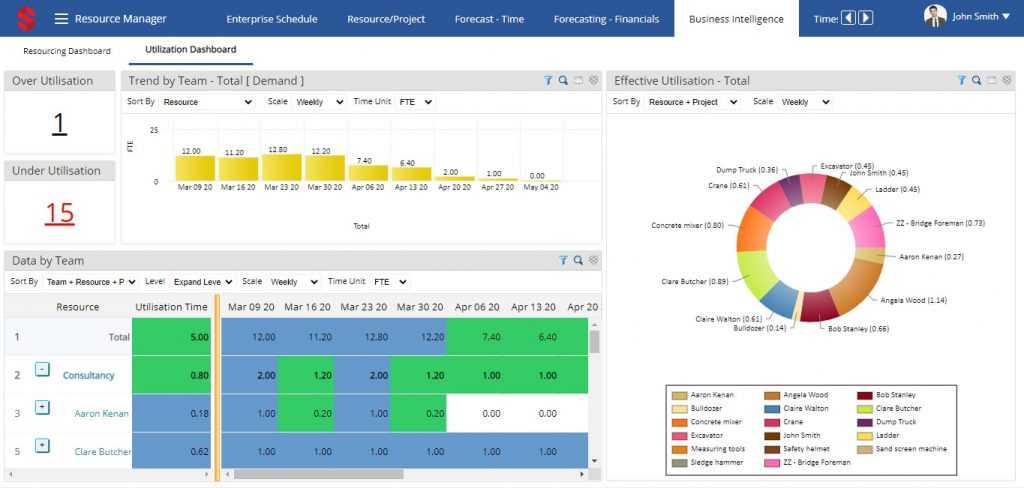
Resources capacity planning
The system should forecast capacity vs demand from multiple perspectives, i.e., by role, department, team, location, skills, etc. It helps you identify short or long-term shortage/excess of resources ahead of time and reduce undesirable hiring/firing decisions.
Project pipeline management
The system should keep track of future project requirements to ensure that your resource pool is optimally balanced and skilled. It will also make it ready to meet the demand of projects in the opportunity pipeline or approval pipeline. It will help in planning hiring or training related decisions ahead of time.
Read More: Beat Market Volatility With Efficient Resource Capacity Planning
Tracking actuals against forecast
The system should help you keep track of actual time spent against the estimates. So that future forecasting can be improved and aligned to reality. It will also help you monitoring shared resources who are working in multiple activities.
How Resource Scheduling and Planning can improve Profitability & Productivity?
Resources scheduling and planning can help an audit, and accounting firm unleashes human resources’ full potential and significantly improve profitability and productivity.
Improve profitable utilisation
A business can improve profitability by implementing strategic and billable utilisation across the enterprise using effective resource management. As a result, valuable and critical resources do not get assigned to not so essential projects or activities.
Reduce resourcing cost
With the help of efficient resource management, overall resourcing cost can be reduced drastically:
- Eliminate under/over skilled resources on projects
- Utilise cost-effective global resources without compromising quality
- Avoid last-minute hiring cost thru with proper capacity planning
- Reduce unplanned attrition
Read More: Reduce Resourcing Cost by 10-30% with Modern Resource Management Solution
Reduce hiring/firing cost
Hiring/ firing costs can be reduced by using workforce forecasting and capacity planning.
Forecasting enables proactive smoothening of project workload and reskilling employees. Frequent Hiring/Firing creates a negative image for the organisation for attracting new talents. It is also an expensive exercise and affects the existing employees’ morale.

Improve workforce productivity
Resource management can improve employee productivity significantly:
- Employees having work allocated as per their competencies and area of interest
- Employees being able to work on different types of projects across the business
- Employees being reskilled to bridge future resource capacity gaps
- Employees being empowered in the early decision-making process
How to Choose the Right Tool for Efficient Resource Scheduling and Planning?
Resource scheduling and planning is crucial for the performance improvement of modern business. So, a business should not just look for a solution that just replaces the current spreadsheet functionalities. It should go much beyond that and ensure that they have a solution that can provide the following:
Forecasts and improves profitability and productivity
Resource management solution should not only be doing scheduling, but it should also help your business to do multidimensional forecasting. It also provides real-time business intelligence to improve business performance, profitability, and productivity.
Read More: 10 Reasons Why Resource Scheduling and Management is Crucial for a Business
Scalable, configurable, and expandable
Every business is different, so their resource management needs. You can’t have one size fits all. That is why a business should select a scalable, configurable, and expandable tool to meet future business needs.
Resolve complexities of matrix organisation structure
Nowadays, most businesses have established a matrix organisation structure to achieve the best utilisation of their workforce. So, it is critical for a business to have a software system that aligns with its matrix organisation structure.
Real-time BI: reports, analytics, and dashboards
Resource demand in a real-life business environment changes every minute. So, it is crucial for a resource management software to get real-time business intelligence, i.e., reports, analytics, and dashboards.
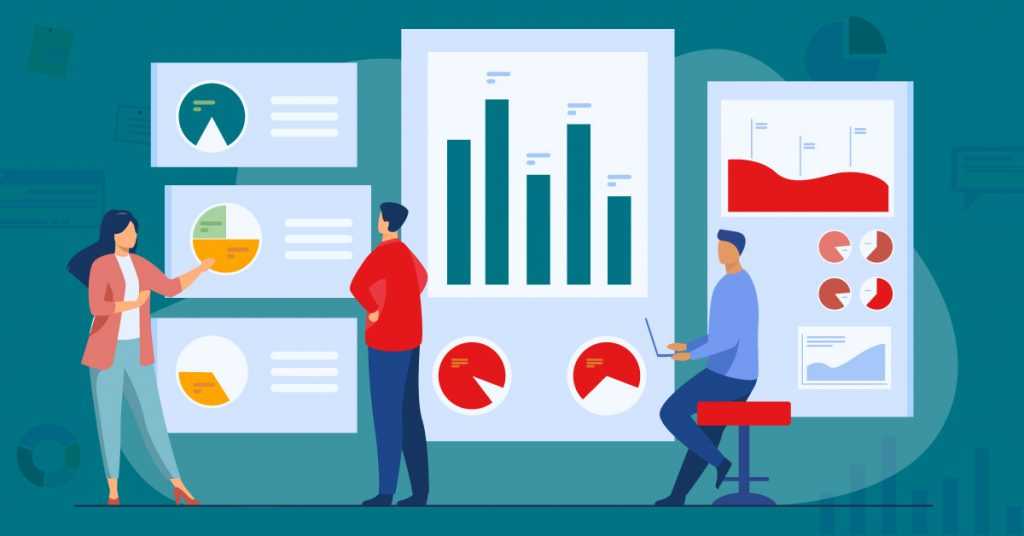
Integrations
Most businesses have already invested in enterprise-level systems holding quite a bit of data required by a resource management system. This specific information can be a resource profile, competencies project detail, etc. So, the resource management system must integrate seamlessly with existing systems.
Resource Scheduling and Planning Techniques and Tips
Following are different techniques and tips for efficient scheduling and planning both human and non-human resources.
Smart Allocation
Smart allocation is critical for an organisation to get the best value out of scarce resources. It includes:
- Enable enterprise-wide visibility of everyone’s capacity, competency, availability etc.
- Establish multidimensional view for each stakeholder, e.g. project-centric view for Project managers, resource-centric view for resource managers, location-centric view for global manager etc.
- Get a 360-degree view of every type of work done by an individual related to the project, non-project, vacation, training activity etc.
- Allocate the right resource to the right project at the right time
Resource Forecasting
In a dynamically changing resource demand scenario, it is critical to have powerful foresight into various aspects of resource management.
- Gain real-time and multidimensional viewing of various types of forecast
- Cater to specific forecasting needs of various stakeholders in a matrix structure
- Enable short-term, medium-term and long-term forecasting
- Be able to plan pipeline projects for most probable opportunities
Resource Optimisation
Resource optimisation is critical to get efficient usage and best value out of the enterprise resources. It involves:
- Identify the right resource for the right project at the right time
- Ensure that the resource is cost-effective
- Avoid over or under-skilled person working on a job
- Minimise over or under utilisation of the resource
Resource Capacity Planning
Resource capacity planning is the process of forecastingthe gap between the capacity and the demand. It involves:
- Identify the shortfall or excesses of resources during different periods
- Ensure that excess capacity is not wasted and utilised effectively
- Take corrective actions ahead of time to overcome the shortfall of resources
Resource Utilisation
Resource utilisation is the way to measure how effectively resources are utilised against their availability or capacity. It is important to ensure that:
- Resources are optimally utilised for productive activities
- Critical resources are assigned to Billable or Strategic projects as a push to Non- billable activities
- Low-cost resources are assigned to Non-Billable or administrative work if possible
Resource Modelling and Simulation
What-if analysis is used to do modelling for various planning scenarios to get the best outcome within existing resource constraints. This exercise involves:
- Juggle around different project timelines based on the priorities
- Put projects on hold if it is not immediately critical for the business
- Analysethe impact of the modelling on resource capacity, cost, utilisation etc.
- Determine the best possible scenario and apply it to the real plan
To know how SAVIOM can help you to do efficient resource scheduling and planning
The SAVIOM Solution
SAVIOM is the market leader in providing an Enterprise Resource Capacity Planning solution. It has more than 20 years of experience working with high valued global companies around the world. SAVIOM also provides tools for project portfolio management, professional service automation, and workforce planning software. So, SAVIOM can help your business to establish an efficient system geared towards your specific business challenges.







